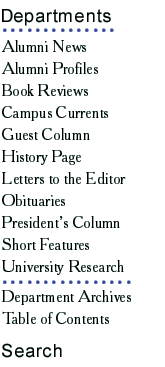

|
 Photo by Philippe Merle 
|
The World's Top Cop The building's floorplan is a hollow square, with four wings surrounding a central courtyard, roofed by a glass pyramid six stories above the ground. Some 350 people from 55 nations work in the building, including 120 police officers on temporary assignment from member countries.
Interpol has no police power of its own; it cannot make arrests. It works through a national central bureau in each member country, which is staffed by that country's own police. This bureau is the single point of contact for foreign police who require assistance with investigations. The U.S., for example, has thousands of law-enforcement agencies at the national, state and local levels, but the national central bureau in Washington can put a foreign police investigator in touch with any of them. The Interpol building could be a corporate headquarters at first glance, but razor wire tops the green-metal fence that circles the perimeter. French gendarmes guard the entrance to the site. To enter, you must walk past the guards and announce yourself via an intercom at the front gate. After you have been buzzed through the gate, you proceed to a one-story entry area, separate from the main building. A wide swathe of bulletproof glass separates you from Interpol security officials, who slide out a drawer for your passport. You put anything you are carrying on a conveyor belt to be X-rayed, then step up to a floor-to-ceiling glass sphere emblazoned with the Interpol logo. The sphere swings open, and you step inside a transparent tube, where you are scanned by sensors. Then the far side of the tube opens and you are greeted by an Interpol official, who uses her badge to admit you into the main building. She leads you down a hallway to the light-filled atrium, lush with palms, ivy, ferns and other plants. A badge is required to move between floors, using an elevator that looks like a glass cylinder rising from the atrium. Posters line the walls of the winding interior corridors--notices with the Interpol seal on a colored square in the right-hand corner. Some, called red notices, carry the photographs, fingerprints and descriptions of some of the world's most dangerous criminals and terrorists, including members of the Al Qaeda network. The notice system is one of Interpol's primary tools in combating crime. Red notices are, in effect, international arrest warrants, honored by 135 countries (but not by the U.S.); blue notices trace offenders and locate witnesses; green notices provide warnings and intelligence about criminal activities and methods; yellow notices advertise missing persons; and black notices are used to identify bodies. The number of notices issued by Interpol has nearly doubled over the last five years. Some 1,740 were issued in 2001 (including 55 red notices for people suspected of involvement in the Sept. 11 attacks) and 1,400 people were arrested or located as a result. It used to take as long as three months for Interpol to distribute a notice. In January, Noble implemented a new procedure that makes it possible to post high-priority notices to member bureaus in 72 hours.
Easy to print version Current issue | Past issues | Class notes Department archives | Send a letter/news | Address updates Advertise | About UNH Magazine | Alumni home | UNH home University of New Hampshire Alumni Association 9 Edgewood Road Durham NH 03824 (603) 862-2040 alumni@unh.edu |
|||||